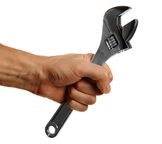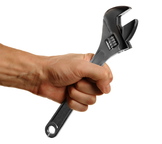WASHINGTON — The blob lives.
It’s big, it oozes, it’s disgusting, and this Thanksgiving, it could be lurking in your house. It’s created in the kitchen, with too much used cooking grease poured down too many drains. And at this time of year, the blob grows bigger and more fearsome than ever.
During the holiday, kitchen pipes are stuffed with more grease, food and fats than any time of the year. Black Friday, the day after Thanksgiving, is a yearly bonanza for retailers – and plumbers.
“When you work for Roto-Rooter, everybody knows you don’t get the day off,” said Paul Abrams, spokesman for the Roto-Rooter plumbing company. “It’s the one day you don’t ask off. Black Friday, it’s all hands on deck.”
In every state, Abrams said, Roto-Rooter’s army of 7,000 employees gears up for a 50 percent increase in service calls from people with clogged sinks, overflowing toilets and drains that don’t work because warm grease cooled in pipes overnight and turned into a blob.
“It’s kind of akin to someone having a heart attack,” Abrams said, with arteries closed by fat.
The problem isn’t solved when plumbers blast grease down the drain using their special know-how and tools. It slips into the sewers, where it grows into a bigger, greasier menace.
Grease from commercial operations and households causes 40 percent of sewer overflows nationwide.
“We are facing a looming crisis in terms of our water infrastructure,” said Adam Krantz, managing director of governmental affairs for the National Association of Clean Water Agencies. “We are seeing some pipes and treatment systems nearing the end of their useful lives.”
This year, the Washington Suburban Sanitary Commission has experienced 136 sewer overflows, 40 of them grease-related, an environmental nightmare. Eighty percent of grease-related overflows happened near southern Maryland residences in Prince George’s and Montgomery counties.
The WSSC operates 5,400 miles of pipe, the eighth-longest system in the nation, serving about 1.8 million people. Overflows send millions of gallons of untreated wastewater with raw human waste into creeks and rivers that flow into the Chesapeake Bay.
“People are using the sewer system as an alternative trash can, a very expensive alternative. Grease and food scraps are being sent down the sinks; disposable products, especially baby wipes … are being flushed down the toilet,” said Robert A. Villee, a committee chairman for the nonprofit Water Environment Federation, an association of professionals who study water quality.
Like water utilities across the country, WSSC officials worry every year at this time. Last year, they ran public-service announcements before movies at local theaters begging viewers to get rid of kitchen grease in a more responsible way: Pour or scrape it from pots and pans into a tin can, let it cool and then toss it into the trash.
The ads didn’t do much good. WSSC decided against spending money on them again this year.
Grease-related sewer overflows are the worst. “If a sanitary sewer overflow happens with grease and not rain, it is pure raw waste,” said Ed Hairfield, a WSSC investigator who inspects how restaurants store used grease.
“In some cases, we’ve had an acre covered with toilet paper and debris,” he said. Once in Southern Maryland, a manhole cover overflowed to a wooded area with a stench so powerful that every beaver there abandoned its dam.
Cooks who grease up bake pans in the kitchen or fry turkeys in deep vats in the back yard rarely stop to consider that rickety Civil War-era sewer systems can’t handle the stuff if they simply pour it down the drain.
Old pipes plus Thanksgiving equals disaster, said Chuck White, a vice president for the Plumbing Heating Cooling and Contractors Association.
“The thing about Thanksgiving is it’s really about the biggest feast we Americans cook for the year,” he said.
It’s also a feast for the garbage disposal. People tend to overload them. They have a sink full of carrot peels and potato peels, they’ll just stick it down the drain and turn it on “and hope it goes away,” White said.
Then comes the residual grease, “just significantly heavier than any other day of the year.” Turkey fats, butter, bacon fat, roast beef fat, pork fat, melted by high heat and poured down the drain with water that does little to break it up.
Down in the cold drain, hardening at 50 to 55 degrees, it turns into the sticky blob, catching all other food products and plugging everything. “It builds up a blob that stops up the drain,” White said.
Plumbers start getting ready Thanksgiving evening, sticking residents with higher bills for making them work a holiday weekend. “You now have a counter full of dishes, and it’s pretty imperative for people to get the drain cleaned and that kitchen cleaned up,” he said.
After making the fix, the workers tell homeowners what they should do with grease. Scrape it, pour it, push it into a can. But few appear to listen. Hundreds of Thanksgivings have passed, and the problem remains.
“It’s like clockwork,” Abrams said. So much so that Roto-Rooter addresses the problem on its website. “The phenomena around Thanksgiving has been constant. It’s the perfect storm.”
Send questions/comments to the editors.




Success. Please wait for the page to reload. If the page does not reload within 5 seconds, please refresh the page.
Enter your email and password to access comments.
Hi, to comment on stories you must . This profile is in addition to your subscription and website login.
Already have a commenting profile? .
Invalid username/password.
Please check your email to confirm and complete your registration.
Only subscribers are eligible to post comments. Please subscribe or login first for digital access. Here’s why.
Use the form below to reset your password. When you've submitted your account email, we will send an email with a reset code.